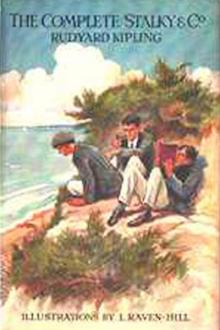Stalky & Co. - Rudyard Kipling (ebooks children's books free TXT) 📗

- Author: Rudyard Kipling
- Performer: -
Book online «Stalky & Co. - Rudyard Kipling (ebooks children's books free TXT) 📗». Author Rudyard Kipling
WHAT IF YOU WANT TO SEND MONEY EVEN IF YOU DON’T HAVE TO? The Project gratefully accepts contributions of money, time, public domain etexts, and royalty free copyright licenses. If you are interested in contributing scanning equipment or software or other items, please contact Michael Hart at: hart@pobox.com
END THE SMALL PRINT! FOR PUBLIC DOMAIN ETEXTSVer.04.07.00*END*
This etext was prepared by A Elizabeth Warren MD, Sacramento, CA aewarren2@aol.com
STALKY & CO.
By Rudyard Kipling
“Let us now praise famous men”— Men of little showing— For their work continueth, And their work continueth, Greater than their knowing.
Western wind and open surge Tore us from our mothers; Flung us on a naked shore (Twelve bleak houses by the shore! Seven summers by the shore!) ‘Mid two hundred brothers.
There we met with famous men Set in office o’er us. And they beat on us with rods— Faithfully with many rods— Daily beat us on with rods— For the love they bore us!
Out of Egypt unto Troy— Over Himalaya— Far and sure our bands have gone— Hy-Brasil or Babylon, Islands of the Southern Run, And cities of Cathaia!
And we all praise famous men— Ancients of the College; For they taught us common sense– Tried to teach us common sense— Truth and God’s Own Common Sense Which is more than knowledge!
Each degree of Latitude Strung about Creation Seeth one (or more) of us, (Of one muster all of us— Of one master all of us—) Keen in his vocation.
This we learned from famous men Knowing not its uses When they showed in daily work Man must finish off his work— Right or wrong, his daily work-And without excuses.
Servants of the staff and chain, Mine and fuse and grapnel— Some before the face of Kings, Stand before the face of Kings; Bearing gifts to divers Kings— Gifts of Case and Shrapnel.
This we learned from famous men Teaching in our borders. Who declare’d it was best, Safest, easiest and best— Expeditious, wise and best— To obey your orders.
Some beneath the further stars Bear the greater burden. Set to serve the lands they rule, (Save he serve no man may rule) Serve and love the lands they rule; Seeking praise nor guerdon.
This we learned from famous men Knowing not we learned it. Only, as the years went by— Lonely, as the years went by— Far from help as years went by Plainer we discerned it.
Wherefore praise we famous men Prom whose bays we borrow— They that put aside Today— All the joys of their Today— And with toil of their Today Bought for us Tomorrow!
Bless and praise we famous men Men of little showing! For their work continueth And their work continueth Broad and deep continueth Great beyond their knowing!
Copyright, 1899. by Rudyard Kipling
CONTENTS
I. IN AMBUSH II. SLAVES OF THE LAMP—PART I. III. AN UNSAVORY INTERLUDE IV. THE IMPRESSIONISTS V. THE MORAL REFORMERS VI. A LITTLE PREP. VII. THE FLAG OF THEIR COUNTRY VIII. THE LAST TERM IX. SLAVES OF THE LAMP —PART II.
“IN AMBUSH.”
In summer all right-minded boys built huts in the furze-hill behind the College—little lairs whittled out of the heart of the prickly bushes, full of stumps, odd root-ends, and spikes, but, since they were strictly forbidden, palaces of delight. And for the fifth summer in succession, Stalky, McTurk, and Beetle (this was before they reached the dignity of a study) had built like beavers a place of retreat and meditation, where they smoked.
Now, there was nothing in their characters as known to Mr. Prout, their housemaster, at all commanding respect; nor did Foxy, the subtle red-haired school Sergeant, trust them. His business was to wear tennis-shoes, carry binoculars, and swoop hawklike upon evil boys. Had he taken the field alone, that hut would have been raided, for Foxy knew the manners of his quarry; but Providence moved Mr. Prout, whose school-name, derived from the size of his feet, was Hoofer, to investigate on his own account; and it was the cautious Stalky who found the track of his pugs on the very floor of their lair one peaceful afternoon when Stalky would fain have forgotten Prout and his works in a volume of Surtees and a new briar-wood pipe. Crusoe, at sight of the footprint, did not act more swiftly than Stalky. He removed the pipes, swept up all loose match-ends, and departed to warn Beetle and McTurk.
But it was characteristic of the boy that he did not approach his allies till he had met and conferred with little Hartopp, President of the Natural History Society, an institution which Stalky held in contempt, Hartopp was more than surprised when the boy meekly, as he knew how, begged to propose himself, Beetle, and McTurk as candidates; confessed to a long-smothered interest in first-flowerings, early butterflies, and new arrivals, and volunteered, if Mr. Hartopp saw fit, to enter on the new life at once. Being a master, Hartopp was suspicious; but he was also an enthusiast, and his gentle little soul had been galled by chance-heard remarks from the three, and specially Beetle. So he was gracious to that repentant sinner, and entered the three names in his book.
Then, and not till then, did Stalky seek Beetle and McTurk in their house form-room. They were stowing away books for a quiet afternoon in the furze, which they called the “wuzzy.”
“All up,” said Stalky, serenely. “I spotted Heffy’s fairy feet round our hut after dinner. ‘Blessing they’re so big.”
“Confound! Did you hide our pipes?” said Beetle.
“Oh, no. Left ‘em in the middle of the hut, of course. What a blind ass you are, Beetle! D’you think nobody thinks but yourself? Well, we can’t use the hut any more. Hoofer will be watchin’ it.”
“‘Bother! Likewise blow!’” said McTurk thoughtfully, unpacking the volumes with which his chest was cased. The boys carried their libraries between their belt and their collar. “Nice job! This means we’re under suspicion for the rest of the term.”
“Why? All that Heffy has found is a hut. He and Foxy will watch it. It’s nothing to do with us; only we mustn’t be seen that way for a bit.”
“Yes, and where else are we to go?” said Beetle. “You chose that place, too—an’—an’ I wanted to read this afternoon.”
Stalky sat on a desk drumming his heels on the form.
“You’re a despondin’ brute, Beetle. Sometimes I think I shall have to drop you altogether. Did you ever know your Uncle Stalky forget you yet? Hisrebus_infectis_—after I’d seen Heffy’s man-tracks marchin’ round our hut, I found little Hartopp—_destricto_ense_—wavin’ a butterfly-net. I conciliated Hartopp. ‘Told him that you’d read papers to the Bug-hunters if he’d let you join, Beetle. ‘Told him you liked butterflies, Turkey. Anyhow, I soothed the Hartoffles, and we’re Bug-hunters now.”
“What’s the good of that?” said Beetle.
“Oh, Turkey, kick him!”
In the interests of science bounds were largely relaxed for the members of the Natural History Society. They could wander, if they kept clear of all houses, practically where they chose; Mr. Hartopp holding himself responsible for their good conduct.
Beetle began to see this as McTurk began the kicking.
“I’m an ass, Stalky!” he said, guarding the afflicted part. “Pax, Turkey. I’m an ass.”
“Don’t stop, Turkey. Isn’t your Uncle Stalky a great man?”
“Great man,” said Beetle.
“All the same bug-huntin’s a filthy business,” said McTurk. “How the deuce does one begin?”
“This way,” said Stalky, turning to some fags’ lockers behind him. “Fags are dabs at Natural History. Here’s young Braybrooke’s botany-case.” He flung out a tangle of decayed roots and adjusted the slide. “‘Gives one no end of a professional air, I think. Here’s Clay Minor’s geological hammer. Beetle can carry that. Turkey, you’d better covet a butterfly-net from somewhere.”
“I’m blowed if I do,” said McTurk, simply, with immense feeling. “Beetle, give me the hammer.”
“All right. I’m not proud. Chuck us down that net on top of the lockers, Stalky.”
“That’s all right. It’s a collapsible jamboree, too. Beastly luxurious dogs these fags are. Built like a fishin’-rod. ‘Pon my sainted Sam, but we look the complete Bug-hunters! Now, listen to your Uncle Stalky! We’re goin’ along the cliffs after butterflies. Very few chaps come there. We’re goin’ to leg it, too. You’d better leave your book behind.”
“Not much!” said Beetle, firmly. “I’m not goin’ to be done out of my fun for a lot of filthy butterflies.”
“Then you’ll sweat horrid. You’d better carry my Jorrocks. ‘Twon’t make you any hotter.”
They all sweated; for Stalky led them at a smart trot west away along the cliffs under the furze-hills, crossing combe after gorzy combe. They took no heed to flying rabbits or fluttering fritillaries, and all that Turkey said of geology was utterly unquotable.
“Are we going to Clovelly?” he puffed at last, and they flung themselves down on the short, springy turf between the drone of the sea below and the light summer wind among the inland trees. They were looking into a combe half full of old, high furze in gay bloom that ran up to a fringe of brambles and a dense wood of mixed timber and hollies. It was as though one-half the combe were filled with golden fire to the cliff’s edge. The side nearest to them was open grass, and fairly bristled with notice-boards.
“Fee-rocious old cove, this,” said Stalky, reading the nearest. ”’Prosecutedwiththeutmost_rigour_ofthelaw_. G. M. Dabney, Col., J.P.,’ an’ all the rest of it. ‘Don’t seem to me that any chap in his senses would trespass here, does it?”
“You’ve got to prove damage ‘fore you can prosecute for anything! ‘Can’t prosecute for trespass,” said McTurk, whose father held many acres in Ireland. “That’s all rot!”
“Glad of that, ‘cause this looks like what we wanted. Not straight across, Beetle, you blind lunatic! Anyone could spot us half a mile off. This way; and furl up your beastly butterfly-net.”
Beetle disconnected the ring, thrust the net into a pocket, shut up the handle to a two-foot stave, and slid the cane-ring round his waist. Stalky led inland to the wood, which was, perhaps, a quarter of a mile from the sea, and reached the fringe of the brambles.
“Now we can get straight down through the furze, and never show up at all,” said the tactician. “Beetle, go ahead and explore. Snf! Snf! Beastly stink of fox somewhere!”
On all fours, save when he clung to his spectacles, Beetle wormed into the gorse, and presently announced between grunts of pain that he had found a very fair fox-track. This was well for Beetle, since Stalky pinched him atergo_. Down that tunnel they crawled. It was evidently a highway for the inhabitants of the combe; and, to their inexpressible joy, ended, at the very edge of the cliff, in a few square feet of dry turf walled and roofed with impenetrable gorse.
“By gum! There isn’t a single thing to do except lie down,” said Stalky, returning a knife to his pocket. “Look here!”
He parted the tough stems before him, and it was as a window opened on a far view of Lundy, and the deep sea sluggishly nosing the pebbles a couple of hundred feet below. They could hear young jackdaws squawking on the ledges, the hiss and jabber of a nest of hawks somewhere out of sight; and, with





Comments (0)